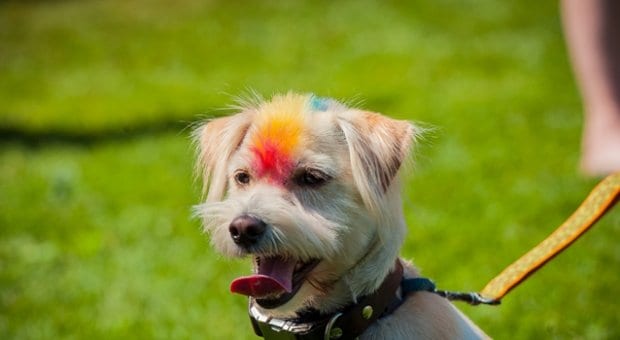
A dog sports a rainbow mohawk at the pooch parade in the park. Credit: Nick Schafer
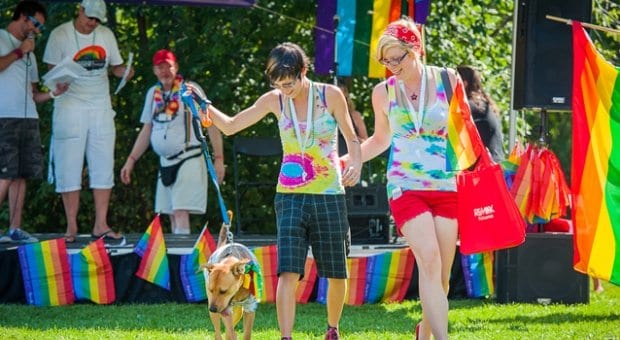
Picnic, proclamation and pooch parade in Mission Creek Park on Sat, Aug 18. Credit: Nick Schafer
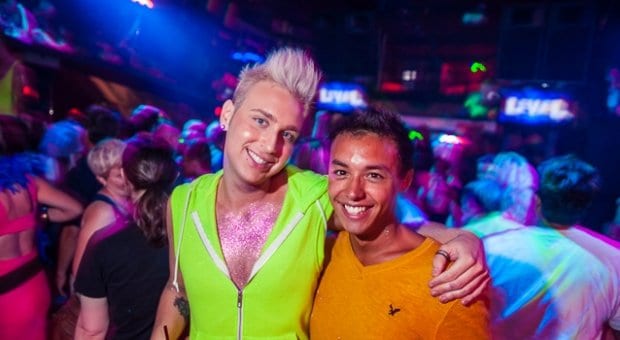
The Okanagan Rainbow Coalition organized Kelowna's sixth Pride Week celebrations Aug 12-19, including a Taste the Rainbow Pride dance party on Sat, Aug 18. Credit: Nick Schafer
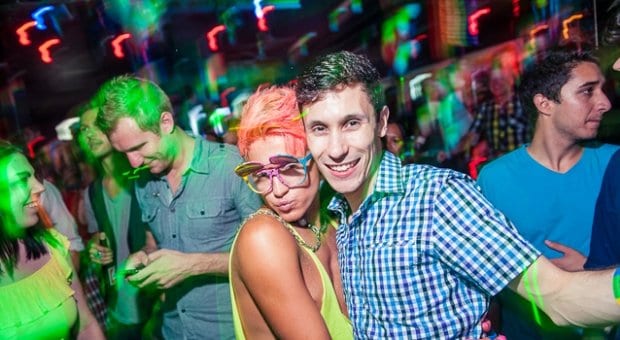
Credit: Nick Schafer
On a scorching Saturday afternoon, Kelowna Mayor Walter Gray and the Okanagan Rainbow Coalition (ORC) settled a 15-year dispute with a peck on the cheek.
Flanked by representatives from all levels of government and before an audience of picnicking families and friends, the kiss was delivered by ORC co-chair Oddree Mayormaynot (aka Wilbur Turner) just moments before Gray read the proclamation of Pride Week 2012 — a proclamation similar to the one he refused to sign in 1997.
That refusal landed him before the BC Human Rights Tribunal.
“The media sensationalized the story,” Gray tells me after the ceremony. “I only wanted to protect my right, as an ordinary citizen, to free speech. It had nothing to do with homophobia.”
The tribunal didn’t see it that way. It was not the mayor’s individual rights that were in question, but his role as an elected official and facilitator of public policy. Gray’s actions were ruled discriminatory, and he was given two choices: sign all proclamations that crossed the mayor’s desk, or none. He opted for the latter.
During Gray’s three consecutive terms, no proclamations were signed in the Okanagan’s largest city. When Sharon Shepherd took the office from him in 2005, one of her first orders of business was to categorically reinstate the endorsements.
During the lead-up to last year’s elections, Gray said in a CBC Daybreak interview, “I will always live with the fact that people were hurt. I regret that, and I don’t want to see them hurt again.”
Although he concluded in that interview that he still would not sign proclamations, as the election grew closer, he pointed to a change in Kelowna’s social temperament and suggested that he would sign the Pride proclamation if the majority of his councillors so advised.
They did, the document was signed, and the rainbow flag flew at city hall. During its official unveiling Aug 18, the mayor attributed the success of the proclamation to a “new breed” of Pride Week organizers, specifically citing the work of co-chair Raymond Koehler in drafting a document that underscored inclusiveness as much as diversity.
But still the mayor was clear: he was not changing his mind about the decision he made 15 years ago. “I’m not righting a wrong,” he says. “But society has come a long way. It’s more caring. Fifteen years ago, Kelowna was about as white and straight a community as you could find in BC.”
One woman I spoke to in the crowd was less subtle in her reminiscing.
“The place used to be a conservative crap-hole,” she deadpanned while we watched a volunteer paint a butterfly on her granddaughter’s beaming face.
The noteworthy part of that phrase is “used to be.” While Kelowna might not be an all-embracing queer haven, it has — like so many places — gotten better.
“All our neighbours know us,” says artist and long-time Kelowna resident Marc Houde. “We’ve become braver, I suppose. I introduce my partner as my husband. We feel comfortable. We own this area as much as anyone else.”
It wasn’t that easy in 1985. “I called the crisis line to find out where the dance was,” he recalls. “The first time, I drove around the block and went home. The second time, I walked in and somebody said, ‘Hi, Marc,’ and everything changed.”
Houde speaks highly of the Okanagan Rainbow Coalition and its previous incarnations. “It saved me. It allowed me to stay. I volunteered on the board, and DJed for them — we even had the phone line in our home for a while.”
While ORC might have been more important when it was the only resource available, Houde believes it’s still critical. “Especially to people just coming out. The celebrations are important. We’re still part of the Bible Belt — we need to push back.”
Bob Callioux convinced his boyfriend to move to Kelowna from Edmonton 20 years ago “to find something different, a challenge.” It was perhaps more of a challenge than he expected.
“It was the first time we felt discrimination walking down the street,” he says.
Six years ago, he married that same boyfriend, and today Callioux is the manager of the Kelowna Farmers’ Market, the largest in BC. He confirms a transformation in Kelowna’s character.
“There are so many gay-owned B&Bs and stores now. Pride Week has changed the broader community. Now regular people are going to Vancouver just to watch their Pride!”
When I ask him the inevitable city-mouse question — “Why Kelowna?” — he sweeps his arm across the blazing blue sky and exclaims, “Look at it!”
Eighteen months in the Lower Mainland convinced James Mullan to return home. Echoing the local meteorological enthusiasm, Mullan points skyward and sings out, “The sun’s here!”
But not even a gay man can live by sunshine alone.
“I’m part of the whole community here,” Mullan says.
Kelowna’s evolution is a theme repeated by more than just its queer residents. “Times are different,” Rick the cabdriver tells me. “The mayor has to be in tune.”
“My girlfriend and I were on our way home from dancing at Kerry Park — frankly the last band wasn’t all that great — when we heard the party.”
That party was the Friday-night Pride barbecue outside ORC headquarters, just a block from the beach. Rick and his girlfriend arrived in time to catch the drag competition hosted by Vancouver’s own Joan-E.
“What a commotion!” Rick roars from the driver’s seat. “And you know what — the right girl won!”
Joan-E, too, proclaims Kelowna’s maturing queer status. “You people don’t need to import drag queens from Vancouver anymore. You’ve got the talent right here!”
When Chantal Couture left her marriage and came out six years ago, she did so, in her own words, fearlessly. “All I cared about was this joy I was feeling.”
Her family feared she was being “too exuberant” and that her business would suffer. If there was a negative backlash, she didn’t see it. But then again, she didn’t really care.
“If I was going to live this life, I needed to be as out there as possible and as honest as possible. And I appreciate that in ways it’s easier for women than men because of a double standard. We’re seen as cuter, in a really patronizing way.”
Couture is quick to point out that Kelowna is still very conservative territory.
A local pro-life organization announced just days after Pride that the city had approved its flag to fly on the same courtesy flagpole the rainbow flag so recently flew from. City council claimed no such approval was given and unanimously decided to end the flying of “courtesy flags” at city hall, thus making the rainbow flag the last flag to enjoy that privilege.
It may not be all faeries and unicorns in the seat of Okanagan Pride, but there is a vital queer community here, a sense of belonging and a sense of ownership. And, despite the inevitable gnashing of teeth from the far right, diversity would seem to be Kelowna’s destiny. The city motto is, after all, Fruitful in Unity.
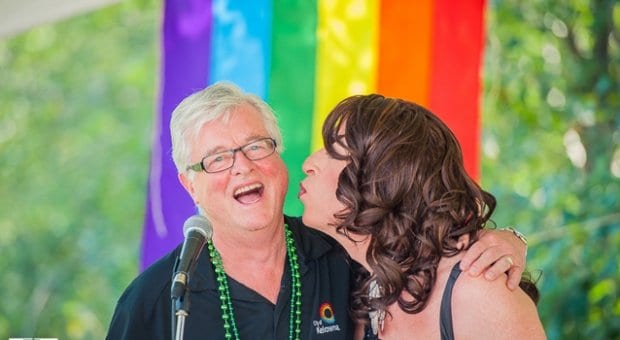
 Why you can trust Xtra
Why you can trust Xtra


